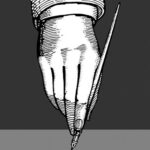Why is the prize industry thriving? Because it allows institutions, authorities, sponsors, jurors, conspirators, and possible prize-winners to make a racket, call attention, appear in the papers, and maybe even sell the prize-winning books, spending very little in the process. Those who do the most work, who have done something truly prize-worthy, do not charge, with the exception of the winner. Quite commonly, the jurors don’t either. Almost all the news write-ups and articles come out for free, and the announcements that do have to be paid for are amply justified as institutional advertising. This is why P.R. manuals recommend contests (be they even to see who can climb a greased pole the fastest): the cannon fodder of contestants, jurors, commentators, and challengers produces cannon blasts of publicity that multiply the results of a token investment.
As a Ph.D. in funerals once explained to us, what costs more than burying an important man are the ads in the papers. Contrary to popular belief, dead bodies are the raw material not of the funerary industry, but rather of the P.R. industry. Likewise, advanced budgeting techniques of cultural administration recommend spending ten to twenty times more on ads for cultural activities than you spend on the activities themselves. The logic is compelling: advertise and something will stick.
What is left of the weight of death, the pleasure of reading, the love for one’s vocation? Thanks to the organization of prizes, funerals, homages, and other industries of the Spirit, good feelings are no longer squandered. Institutions make noise, organizers earn points, and we can all keep cuttings from the paper: to show, and even feel, that we did something.
Translated by Arthur Malcolm Dixon
Gabriel Zaid, “Premios, muchos premios,” in Cómo leer en bicicleta, in Obras de Gabriel Zaid Vol. 3, 3rd ed.
(Mexico: El Colegio Nacional, 2020), 179-180.
Published with the author’s permission.



